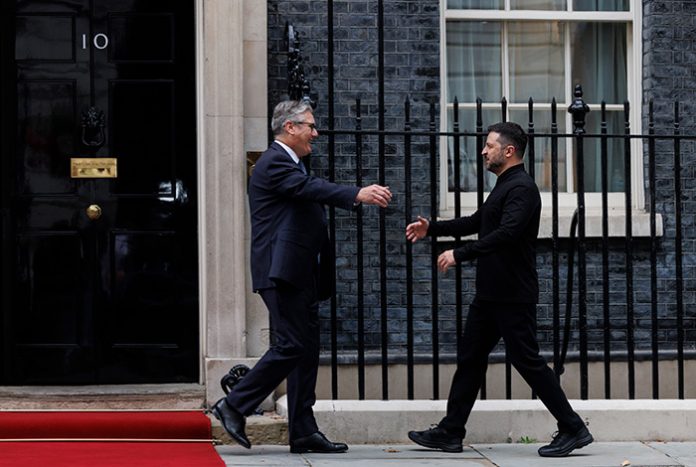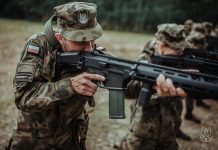
“The risk is that a lack of joined up thinking from the UK on Russia – and vice versa – will create a more precarious environment with plenty of scope for misunderstanding. The prospect of accidental escalation and military confrontation with Moscow is high and without careful management, risks becoming uncontrolled.” – Emily Ferris, a Senior Research Fellow at RUSI, argues that the UK’s military and political support of Ukraine – and role as a convening power of the Coalition of the Willing – have earned it an outsized role as Moscow’s enemy.
Read the digital document above, download a copy here or continuing reading below.
RUSSIA’S approach to the UK is filled with contradiction, misunderstanding and both over and under-estimation. At once an object of curious fascination, suggestions of Britain’s insidious and all-powerful intelligence capabilities sit alongside simultaneous derision of our political position as an empire with its best days behind it. But nevertheless, ‘perfidious Albion’ holds an important place in Russian history and modern understandings.
Russia’s views about the UK as a political and economic entity can be separated from the Kremlin’s modern perspective of our armed forces, intelligence agencies and understanding of the UK as a naval power.
Officially, the UK is given scant mention in Russia’s Foreign Policy Concept, an important document that offers a sense of Russia’s broad policy attitudes (but not its implementation), published in 2023 amid the war. Here, Britain is referred to dismissively as part of the ‘Anglo-Saxon’ world, a term popularised by the Russian defence community, which frames the UK as a footnote in its relationship with the otherwise more significant United States, and as an empire in decline.
Russia’s foreign policy is often rife with contradiction, but this confusion allows Russia a degree of flexibility in implementation. The Concept is not set in stone, and parts of British policy – such as sanctions legislation – are variously held up as an example of the UK as a hostile entity seeking regime change in Moscow. But aspects of the UK, such as respect for its education system, perceptions of a vestigial class system that seems to still appeal to Russia, and an attractive (and poorly regulated) financial and real estate sector, can sit comfortably alongside this Russian narrative of the UK, with little conflict.
In practical terms, Russia certainly appears to expend a great deal of its own intelligence resources, cyber capacity and economic tools to variously disrupt or penetrate British companies, individuals of interest or its critical national infrastructure. For its military and political support of Ukraine and role as a convening power of the Coalition of the Willing, the UK has been given an outsized role as Moscow’s enemy, viewed as working in tandem with the Ukrainian security services to disrupt Russia’s political goals and even to undermine Russia from within by fomenting regime change.
For example, in June 2025 Russia’s ambassador to the UK, Andrei Kelin – a combative figure – maintained that Ukraine’s drone attack on Russian airfields would have been assisted by the British Special Forces. This fits with Russia’s contradictory perception of an all-powerful British intelligence service with strong force projection abroad that is capable of influencing major points during the war, while also suggesting that without the protection of the Americans, the UK is fundamentally weak. Kelin’s viewpoint was reinforced by Foreign Minister Sergei Lavrov some days later at an event called Forum of the Future – 2050, at which he asserted that the UK was responsible for sponsoring Ukrainian ‘terrorism’ – the current language Moscow uses to frame Ukrainian activity within Russia. While Lavrov suggested that the presence of American support for Ukraine’s actions could not be verified, he was certain of the UK’s hand.
As with many of Russia’s foreign policy relationships, its understanding of the UK and the many accusations thereof are rooted in reflections of itself; its concept of what constitutes British interests and capabilities, and Moscow’s understanding of how our foreign policy is shaped and influenced.
In military and political terms, the Russian defence community lacks a consensus on how the UK government functions with respect to Russia; the proportionate role of think tanks and academia in the debate on Russia policy, and what the overarching current government policy on relations with Russia is. This is in part a reflection of our inability to clearly convey our stance on Russia to the Russians themselves, instead clustering our analysis of Russia together with China, North Korea and Iran, when in fact the nature of the threat posed by these actors is highly varied in intent and capability, and the linkages between them all are very different.
Russia has perhaps three key perceptions of the British military, running counter to one another but that are also able to sit alongside one another.
First, Russia recognises that the UK is at its strongest as a political convening power, a nuclear power – and member of the P5 – and as a provider of training and arms to the Ukrainians. The British government’s ability to call forth France and Germany in service of the Coalition of the Willing was an important signal to Moscow that the UK was not isolated in its security stance and that it could continue to work with partners against Russia. The nuclear aspect appears to be much more of a concern to Moscow, which, while decrying the UK’s diminishing sea power abilities and small ground force contingent, has pointed to the UK’s growing interest in its own nuclear capabilities.
Second, Russia’s perception that the UK was a political puppet of the United States was tested when President Trump returned to power earlier this year. Russia’s understanding has been that the relationship was mostly one way – that the Americans directed British policy in tandem – but the discord over Russia policy between what Moscow began to refer to as the left and right flanks of NATO were increasingly stark. This forced the Russians to reconfigure their understanding of the UK-US dynamic; whether the UK would attempt to divert Trump from seeking a relationship with Moscow, or whether this was a potential fracture in the transatlantic relationship that Moscow could exploit and pry further apart. Russia has used the UK’s reliance on US weaponry, such as Tomahawk missiles, as an example of the UK’s weak defence industrial base and inability to produce its own versions.
Third, it is not clear that Russia distinguishes the British armed forces’ capabilities from those of NATO more broadly. Certainly, the announcement of the British Security Defence Review and the National Security Strategy in 2025 returned to the fore discussions about the UK Armed Forces’ strength and capabilities, particularly in Russia. If the British Army is usually considered one constituent part of NATO, the latest publications forced a more focused conversation in Moscow about how to delineate between different powers. Similarly, the Secretary of State for Defence John Healy’s remarks in October 2024 about the UK’s willingness to engage Russia militarily – despite acknowledging that it lacked the capabilities to do so – generated interest in Moscow in assessing the UK’s capabilities.
But unpacking Russia’s responses to these statements are revealing. Assessments of British capabilities in the Russian media appears to be confined to translations of negative opinions given by British commentators and the Ministry of Defence on the state of the armed forces. This lack of Russia-based analysis could suggest that the negative coverage might speak for itself, but also implies that Russian analysts might lack their own nuanced understanding of how the British army operates, and what its weaknesses may or may not be.
Some analysts, such as Vasily Dandykin, Captain First Rank of the Reserve, frequently asked to comment in the media on British capabilities, frame the British Army as small and weak, with a shortage of personnel and equipment, and a broader unwillingness to serve. But Russian commentators like Dandykin have assessed the British Army before, and just two years prior to his latest comments, in 2023, he noted the UK’s high quality nuclear submarine fleet and reasonably high quality weaponry. He also assessed that while the British Army is not large, it has significant combat experience, particularly in conjunction with the US. This offered a far more tempered understanding of the UK’s capabilities.
A third and perhaps less kind reading might be that the Russians simply do not expend significant resources on analysing British military capabilities in isolation, because they are not perceived as an existential threat. However, this coverage also indicated that Russia pays close attention to the negative assessments of the British Army from its own spokespeople, politicians and the Ministry of Defence.
Undoubtedly, Russia has interests in understanding the operational capabilities of the British military, but has done so observationally – most likely through its ally, Belarus. Before the UK’s contacts with Belarus were severed due to its auxiliary role in the Ukraine war, the UK and Belarus had pursued some limited bilateral military cooperation, likely with Moscow’s permission. The Royal Marines’ training in 2020 of a small contingent of Belarusian troops in tactical and navigation skills did not at the time receive any pushback from Moscow, which likely saw this as an intelligence gathering opportunity, given Russia’s own interoperability with the Belarusian military.
Are we at war? For all intents and purposes, Russia believes it is already at war with NATO, and is apportioning political and military resources accordingly.
Comments from Putin himself, as well as from his Security Council – already a hawkish grouping but reflective of the shifting of political conversation in Russia to the right – in particular its head Sergei Shoigu, suggest that NATO intends to be at war with Russia by 2030, which has been used as a pretext for increasing Russian rearmament. This stance was latterly echoed by Deputy Foreign Minister Alexander Grushko, alongside deputy of the Security Council Dmitry Medvedev in July, who maintained that pre-emptive strikes on the West should be part of Russia’s response. There is serious financial backing behind these comments, with pledges to increase Russia’s standing army to 1.5 million men, and concomitant investments in technology, information and intelligence sharing with allies Iran and China. Russia is already drawing lessons from what the war has taught Moscow about warfare, geography and deterrence, and about Western capabilities.
The risk is that a lack of joined up thinking from the UK on Russia – and vice versa – will create a more precarious environment with plenty of scope for misunderstanding. The prospect of accidental escalation and military confrontation with Moscow is high and without careful management, risks becoming uncontrolled. The UK lacks clarity on where our military, financial and information resources should be allocated when it comes to analysing Russia’s intents and capabilities. The siloing of expertise on Russia and how it operates, how policy-making is conducted and who has the means of implementing it (and who does not) mean that London’s presentation of facts to Moscow are framed in terms that leave scope for misreading. We should address this before it is too late.




